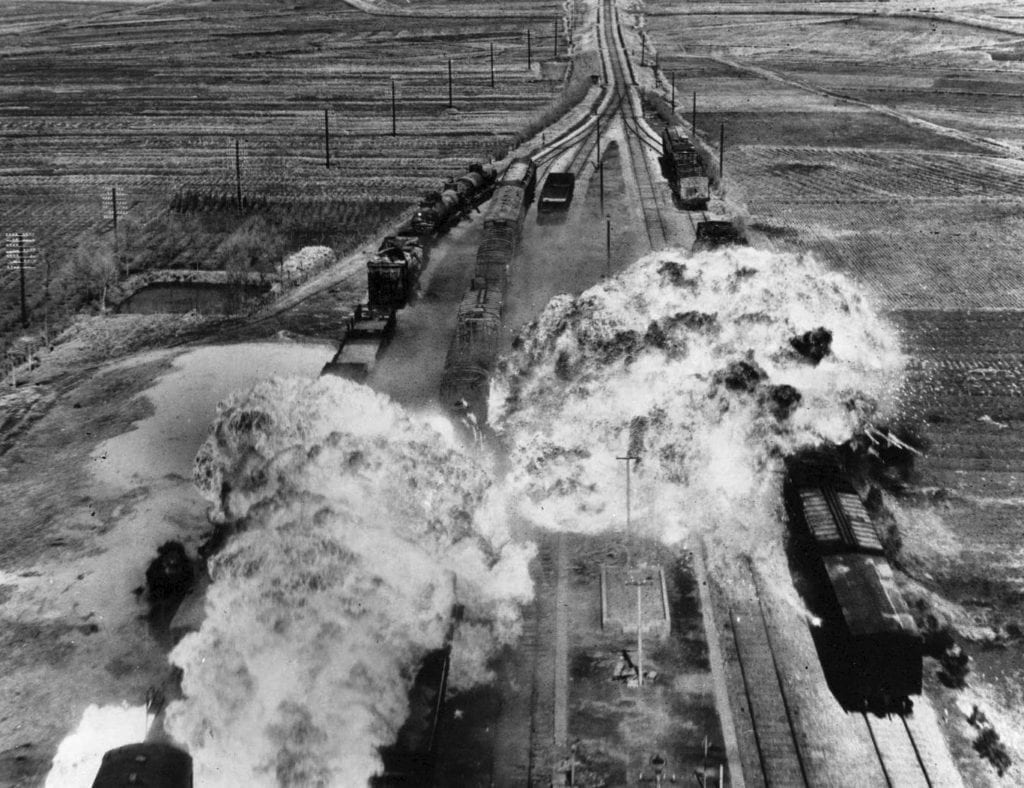Charles Halsted
Davis, California, United States
 |
| Korean War, train attack. 1950. US Army Military History Institute. Public Domain. |
A fifty-five-year-old Korean man arrived at the emergency room of our teaching hospital after suddenly vomiting blood during the night. Called next morning to consult in our intensive care unit, I reviewed his chart and pulled back the curtain surrounding his bed. I found him barely responsive with moderate tachycardia of one hundred beats per minute and a slight fever of thirty-eight degrees Celsius. His blood pressure was within normal range, and his mouth breathing was regular with a normal rate. Carefully rolling back his eyelids, I found yellow sclerae but normally reactive pupils.
When I pulled the bedsheet down to his waist, I discovered spiderlike clusters of veins across his chest and upper abdomen. The liver was firm and appeared to be the size of a very large cantaloupe. By gentle tapping on each side, I produced a rolling intrabdominal fluid wave. I palpated the tip of his spleen in his left upper abdomen. Starting from below with his feet, I observed that his lower legs were as thin as sticks, with mild ankle edema.
Laboratory tests from the midnight emergency room visit were consistent with liver failure: elevated serum bilirubin and alkaline phosphatase, low serum albumin, and a moderately elevated blood ammonia level. Results of diagnostic tests from the morning blood draw were pending.
My patient clearly suffered from long-term liver disease, its cause uncertain until his wife arrived and filled in the historical gaps. He never drank alcohol, since it caused the severe flushing common among Asians. She also revealed that he had fought for the South in the Korean War thirty-five years ago. As the North Korean and Chinese troops pushed the South Korean and American soldiers below the thirty-eighth parallel, my patient suffered a deep bullet wound in his thigh. Back in South Korea, he was treated in a U.S. Army field hospital, where he received five units of blood during surgical removal of the bullet and repair of the wound. I concluded that the blood transfusions were the most likely source of his liver disease and liver failure. New laboratory results were positive for serum hepatitis B antigen.
After the war, my patient married the Korean nurse who had cared for him in the field hospital. For the next thirty years, he worked as an accountant in Seoul. They had one child, a daughter, now twenty years old. The family had emigrated to San Francisco four years earlier to be close to relatives, just in time for their brilliant daughter to attend college at nearby Stanford University.
During the postwar years, he wrote a memoir of his wartime recollections, which his wife and daughter later translated into English. More recently, they had transformed his life story into an epic poem in heroic verse.
I continued to evaluate his illness on my daily patient rounds. He became more responsive, but his confusion never completely cleared, and his laboratory tests remained abnormal. After each patient visit, I always updated his wife and daughter on his progress. Paradoxically, on day seven, his breathing slowed and stopped. His wife and daughter were at his bedside.
After I talked with them about his dying and his diseased liver that could never be made whole, his wife handed me a gift: his lifetime memoir in English verse. Later that year, I learned that their daughter had enrolled in the first-year class of our medical school.
CHARLES HALSTED, MD, a retired academic physician, was educated at Stanford University (BA, 1958), University of Rochester School of Medicine (MD, 1962), Cleveland Metropolitan General Hospital (internship and residency), and Johns Hopkins Hospital (specialty training). He was a faculty member in the UC Davis School of Medicine from 1974 until his retirement in 2016, when he started a new career as a poet. His poems have been published in many poetry journals and in a chapbook, Breaking Eighty. His full book, Extenuating Circumstances, is in press. Many of his poems address the physician-patient relationship.
Spring 2019 | Sections | War & Veterans

Leave a Reply